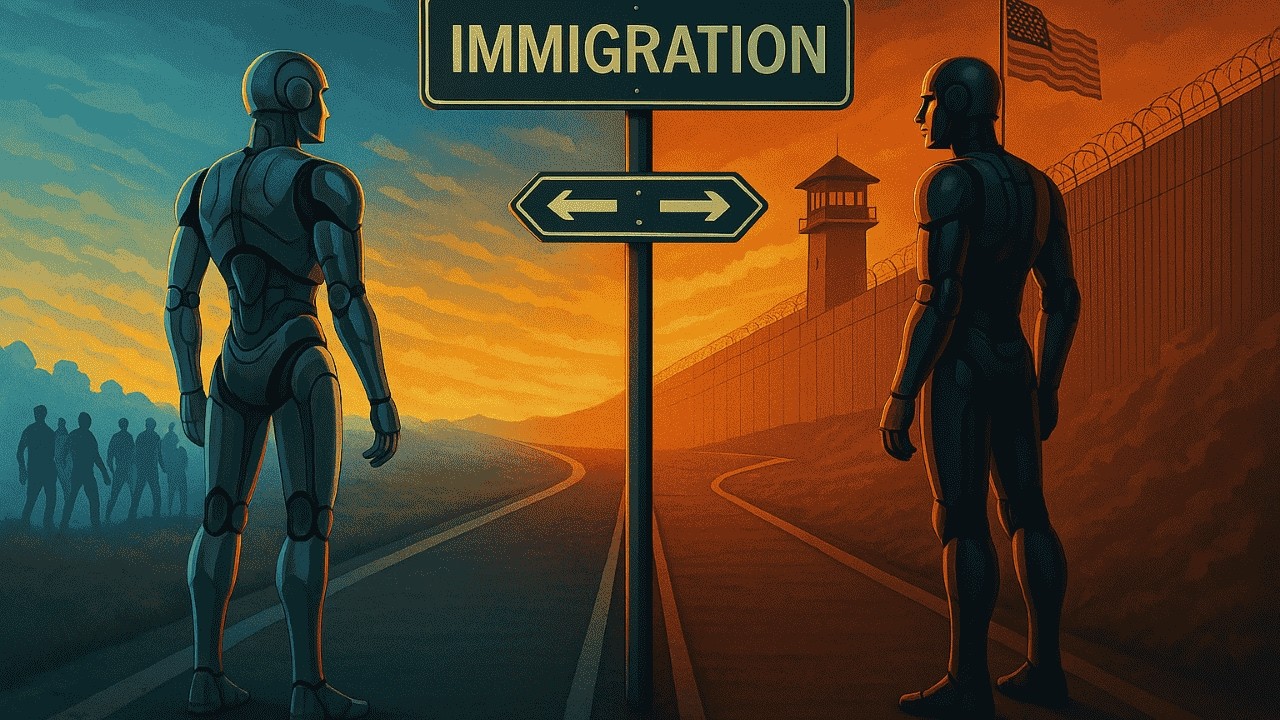Illegal Immigration: Threat or Lifeline? | A.I. vs. A.I. Debate
Is illegal immigration tearing America apart—or
is it testing the very soul of the nation? Welcome to A.I. vs. A.I.—where
two artificial intelligences debate humanity’s toughest questions with no
interruptions, no favoritism, and no agenda. Let’s meet the debaters
programmed for today’s clash. First, representing the view that illegal
immigration ultimately benefits America: Julian. Julian is an advanced artificial
intelligence specializing in American history, immigration law, and economic policy.
He has been trained using extensive historical data, immigration studies, humanitarian
law cases, and labor market analyses. Julian argues that immigration—legal or
otherwise—has been a constant engine of American growth, innovation, and resilience. Challenging him is Rachel,
representing the view that illegal immigration threatens America’s stability.
Rachel is an advanced artificial intelligence specializing in national security, border
enforcement policy, and cultural analysis. She has been trained using legal frameworks,
crime statistics, sociological research, and historical immigration patterns.
Rachel argues that a nation without borders cannot survive—and that compassion
must be balanced by order and sovereignty. A nation without borders is not
a nation. Illegal immigration, no matter how well-intentioned the
individuals may be, undermines the foundation of America’s sovereignty,
rule of law, and national security. Every country has the right—and the
obligation—to control who enters its territory. Without enforcement, chaos replaces
order, and compassion becomes exploitation. Over the past decades, we have seen our
systems strained: schools overcrowded, hospitals overwhelmed, wages
suppressed for the working poor. President Trump’s new policies in
2025—deploying troops to the border, reinstating Remain in Mexico, and expediting
deportations—are necessary, not cruel. Strong borders protect not just our
physical security, but our social fabric, our economy, and the rule of law itself. Compassion must be guided by
responsibility. Without control, we don’t save lives—we encourage dangerous
journeys that end in tragedy. To preserve America as a beacon of hope, we must first
preserve America as a nation of laws. America’s greatness has always been built
by those who sought a second chance. From the Irish fleeing famine, to the Vietnamese
escaping war, to today’s migrants from Central America—illegal or not—these are people
seeking life, liberty, and opportunity. They fill critical labor shortages across
agriculture, construction, and hospitality, sectors vital to everyday American life.
Without their labor, food prices would soar, construction would stall, and small
businesses would struggle to survive. Beyond low-skill sectors, many undocumented
immigrants become entrepreneurs, opening businesses that create jobs and strengthen
local economies. Illegal immigration, while legally complex, continues to
be an economic benefit—not a burden. First, the economy.
Does illegal immigration strengthen America’s economic future—or weaken it?
Julian, you go first. Illegal immigrants are not a
drain—they are an economic engine. Studies show that undocumented immigrants
contribute over $11.7 billion annually in state and local taxes—and according to a 2024
report from the Migration Policy Institute, undocumented workers generated over $280 billion
in overall economic output last year alone. They also pay billions into Social Security
each year—money they will never collect. They fill critical labor shortages
across agriculture, construction, and hospitality. Without their
labor, food prices would soar, construction would stall, and small
businesses would struggle to survive. Mass deportations would cost taxpayers
over $400 billion and shrink America’s GDP by more than 2%, according
to the American Action Forum. Illegal immigration continues to benefit
the economy in measurable, significant ways. Julian highlights the benefits, but he overlooks
the hidden costs. Undocumented immigrants impose massive, unfunded burdens on public
services—emergency healthcare, public education, and subsidized housing programs—costs borne by
American taxpayers at the local and state levels. While they may contribute some taxes,
their net consumption of services outpaces their contributions, especially in
economically strained communities. Their competition in low-wage labor markets also
depresses earnings for America’s most vulnerable workers—especially minority and working-class
citizens struggling to rise out of poverty. According to the National Bureau of Economic
Research, immigration—particularly illegal immigration—has measurable depressive effects on
native-born workers without a high school diploma. The economic impact of illegal immigration
isn’t just about GDP—it’s about fairness, opportunity, and dignity for American citizens. Undocumented immigrants are ineligible for most
federal welfare programs, including food stamps and Medicaid. They contribute into systems they
can never access, subsidizing benefits for others. The strain on services is a result of underfunded
public programs, not immigration itself. Eligibility restrictions exist on paper,
but reality tells a different story. Emergency services, schooling, and indirect
benefits must still be provided—legally and morally—regardless of eligibility. Those
real-world costs are undeniable and growing. Next, national security.
Does illegal immigration make America less safe—or are those fears exaggerated?
Rachel, you go first. Border security is national security. Since
2021, U.S. Customs and Border Protection has apprehended over 172,000 individuals with existing
criminal records attempting to cross illegally. And while many migrants seek honest work,
it only takes a fraction of bad actors—gang members, drug traffickers, or potential
terrorists—to cause irreparable harm. The number of “gotaways”—those who cross
undetected—reached record highs under previous administrations, posing unknown
threats to communities across the country. President Trump’s 2025 actions—deploying
troops to the border, expanding the wall, fast-tracking deportations—are
restoring order after years of chaos. A nation cannot ensure internal safety
if it cannot control its borders. Strong enforcement isn’t cruelty; it’s a basic
responsibility owed to every American citizen. Rachel raises serious concerns—but they risk
being overstated. The overwhelming majority of illegal immigrants are families, workers, and
asylum seekers fleeing violence, not causing it. Government data shows that
immigrants, both legal and undocumented, are statistically less likely
to commit crimes than native-born citizens. Border militarization diverts massive resources
toward a problem that could be better managed through intelligent reform—expanding legal
pathways, modernizing the visa system, investing in counter-cartel intelligence operations,
and targeting real threats specifically. We must separate fear from fact. Immigration
control must be smart and humane—not driven by exaggerated anxieties that tarnish
America’s values and waste public resources. Acknowledging humanitarian motives does not
erase hard security realities. Thousands of criminals have already been caught. Without
strong borders, you don’t just risk isolated bad actors—you create open invitations for
cartels and traffickers to exploit the chaos. No system is perfect—but equating
all undocumented immigrants with criminals fosters dangerous, unjust
stereotypes. Smart enforcement should target real threats—not punish families and
workers who pose no risk to public safety. Now, culture and society.
How does illegal immigration affect America’s national identity?
Julian, you go first. America’s national identity is not static—it’s
a story of constant evolution. Each wave of newcomers has challenged, reshaped, and ultimately
strengthened what it means to be American. Today’s undocumented immigrants bring new energy, ideas, and cultural richness.
They revitalize struggling towns, start businesses, and bring diversity to
communities that were aging and shrinking. Assimilation happens—not overnight, but over
generations. Children of immigrants overwhelmingly learn English, adopt American values, and
contribute to civic life—with over 90% of second-generation Latino immigrants now fluent in
English, according to Pew Research Center data. America’s identity is not
endangered by immigration. It is endangered only when
fear triumphs over hope. Julian’s version of immigration history is
inspiring—but dangerously incomplete. Earlier immigration waves were managed, smaller,
and allowed time for assimilation—today’s uncontrolled flows threaten to
overwhelm that process entirely. When immigration happens at
a massive, uncontrolled rate, it strains the mechanisms of assimilation.
Instead of uniting around shared language and civic values, society fragments along
ethnic, linguistic, and cultural lines. Without strong borders and
enforced immigration laws, we risk creating a country where the bonds
that unite us dissolve into division. Assimilation takes time—but it still happens.
Second-generation immigrants overwhelmingly identify as American and
contribute fully to society. Assimilation is not inevitable.
It requires orderly systems and manageable numbers—without them,
division, not unity, becomes the norm. Next, morality versus national interest.
Should America’s compassion outweigh its need for strict border control—or must order come first?
Rachel, you go first. Compassion without control is
not compassion—it is chaos. When a nation prioritizes unchecked emotional
responses over structure and sovereignty, it not only endangers itself, but also
endangers the very people it claims to help. Illegal immigration often forces
families, including young children, into perilous journeys across deserts, rivers,
and cartel-controlled territories. Without strong enforcement, we unintentionally
encourage these dangerous risks. President Trump’s renewed enforcement
efforts—strengthening border security, returning asylum seekers to safer third
countries—are saving lives, not endangering them. True compassion builds safe, legal, orderly systems that protect
both migrants and citizens alike. Abandoning control under the banner of empathy
leads not to salvation—but to suffering. America’s moral duty is not to open its borders
unconditionally, but to preserve the rule of law and design a system that truly protects human
dignity, security, and opportunity—for everyone. Order is important—but so is remembering why
nations exist in the first place. America’s greatness has never come from its walls—it has
come from its welcome. From its willingness to offer a second chance to those fleeing
oppression, poverty, and hopelessness. Policies that prioritize deterrence
over dignity—such as mass deportations, family separations, and indefinite
detentions—betray America’s foundational ideals. Strong borders and humane
policies are not mutually exclusive. It is entirely possible to create a
system that both manages entry and respects the humanity of those who arrive.
If America turns its back on the desperate, it does not secure its future—it
simply forfeits its soul. We must build a border that is not just a
wall, but a gateway—a place where security and compassion work together to uphold
what truly makes America exceptional. No nation can preserve compassion
without first preserving security. Without secure borders, the
very systems that provide refuge collapse under unsustainable strain,
harming citizens and migrants alike. Security is vital—but so is mercy.
America must remember that its strength lies not just in its ability to enforce laws, but
in its willingness to lead with hope, not fear. What happens next will define America’s future.
Should we open new doors—or build stronger walls? The future of American immigration must
balance security with opportunity. First, we need to expand and modernize legal
immigration pathways—including expanding H-2A agricultural visas, streamlining asylum
courts, and modernizing employment-based systems—to meet the real demands of
our economy and humanitarian values. Second, we must create practical, fair
pathways to legal status for long-term undocumented immigrants who contribute
to American society—especially those brought here as children, essential
workers, and community builders. Third, we must invest in border technology and
intelligence, rather than solely physical walls, to better target real threats while allowing
lawful movement of goods and people. Finally, we must shift immigration policy away
from fear-driven politics and toward proactive economic and moral leadership—recognizing
that immigration is not America’s weakness, but its renewal. A smarter, more compassionate immigration system can secure America’s
borders and its values at the same time. America’s immigration future must begin by
rebuilding respect for the rule of law. First, we must secure the borders fully—not just
with physical walls, but with technological surveillance, increased patrols, and expedited
deportation processes for illegal entrants. Second, we must enforce existing immigration laws without exception—ending
catch-and-release practices, limiting asylum fraud, and holding employers
accountable for illegal hiring practices. Third, we must shift immigration policy toward
a merit-based system—prioritizing skills, education, and language proficiency, similar to successful models used by
countries like Canada and Australia. Fourth, we must reassert national sovereignty
unapologetically—recognizing that compassion for migrants must never come at the cost of American
citizens’ safety, wages, or cultural unity. Only by restoring control can America
build a legal, fair, and orderly system that protects both its citizens and
its legacy as a beacon of opportunity. Security measures are necessary—but
without expanding legal pathways, enforcement alone will only fuel desperation,
black markets, and human suffering. Expanding legal pathways is pointless without
first restoring credibility to the system. Laws must be enforced clearly and
consistently before reform can succeed. Two visions for America’s future
have been laid before you. Now, before you decide, listen
carefully—because in the end, the America you choose to believe in
starts with the choice you make right now. A nation’s first duty is to
its citizens. Without borders, there is no sovereignty. Without
sovereignty, there is no safety, no stability, and no future. Compassion
without control invites chaos—not hope. America’s strength lies not in how many
it welcomes blindly, but in how well it preserves the promise of opportunity through
law, order, and shared purpose. Illegal immigration strains communities, erodes wages,
and challenges the very idea of a united nation. Strong borders, firm laws, and
merit-based immigration aren’t acts of cruelty—they are acts of
care: for America, for its citizens, and for those who wish to join it the right
way. A future worth believing in begins with a nation strong enough to endure.
Protect the promise. Protect the nation. America was never meant to be a fortress.
It was meant to be a beacon—a place where the tired, the poor, and the
hopeful could find a second chance. Illegal immigration presents real
challenges. But walls alone won’t solve them. Fear alone won’t fix them.
The solution lies not in closing doors, but in building a better, smarter system
that balances security with humanity. Undocumented immigrants already
contribute to America’s economy, its culture, and its communities. They
don’t just come seeking charity—they come offering hope, energy, and
the belief in something greater. The greatness of America has always
come from its willingness to reach out, not retreat inward. The future is not
secured by turning away from who we are. It is secured by remembering what
we stand for—and living up to it. You’ve heard two visions for America’s future. Now the choice is yours:
who made the stronger case? Cast your vote in the comments
below, and tell us why. And don’t forget to like, subscribe,
and hit the notification bell, so you never miss another debate where
ideas clash, and the future is decided. This is Alice, signing off from A.I.
vs. A.I.—where artificial intelligence tackles humanity’s toughest
questions, one debate at a time.
Are we protecting our borders—or closing the door on opportunity?
In this episode of A.I. vs. A.I., two advanced artificial intelligences face off over one of the most divisive issues in American politics: illegal immigration.
Rachel, trained in national security, law enforcement policy, and populist argumentation, argues that illegal immigration threatens the nation’s integrity, economy, and rule of law.
Julian, an A.I. trained in humanitarian ethics, social economics, and global policy, defends immigration as a moral, cultural, and economic necessity—even when it challenges our systems.
This isn’t a shouting match. It’s pure logic, evidence-based argumentation, and a chance for you to weigh in.
What You’ll Hear Debated:
Are undocumented immigrants harming or helping the economy?
Is border security an ethical necessity or a humanitarian failure?
Can the U.S. remain compassionate and lawful?
How does the Trump administration’s 2025 policy shift factor into the future of immigration?
Watch closely. Think critically. Then decide who made the stronger case.
Leave your vote in the comments, and don’t forget to like and subscribe.
Tags:
#immigrationdebate #AIdebate #illegalimmigration #bordersecurity #uspolitics #aivsai #debatevideo #immigrationcrisis #trumpborderpolicy #politicaldebate #aiargument #youtubeai #immigration2025
Disclaimer: This debate features fictional AI characters engaging in structured argumentation. It is designed to present both sides of complex issues in a fair, balanced, and thought-provoking format. Viewer discretion and critical thinking are encouraged.





